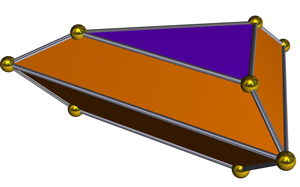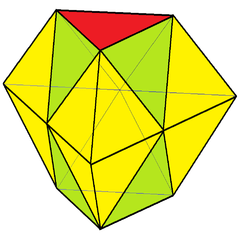Triangular bifrustum
| Triangular Bifrustum | |
|---|---|
 | |
| Type | Bifrustum |
| Faces | 6 trapezoids, 2 triangles |
| Edges | 15 |
| Vertices | 9 |
| Symmetry group | D3h |
| Dual polyhedron | Elongated triangular dipyramid |
| Properties | convex |
Net | |
The triangular bifrustum is the second in an infinite series of bifrustum polyhedra. It has 6 trapezoid and 2 triangle faces. It may also be called the truncated triangular bipyramid; however, that term is ambiguous, as it may also refer to polyhedra formed by truncating all five vertices of a triangular bipyramid.[1]
This polyhedron can be constructed by taking a triangular dipyramid and truncating the polar axis vertices, making is into two end-to-end frustums. It appears as the form of certain nanocrystals.[2][3]
A truncated triangular bipyramid can be constructed by connecting two stacked regular octahedra with 3 pairs of tetrahedra around the sides. This represents a portion of the gyrated alternated cubic honeycomb.
References
- ↑ For instance, Haji-Akbari et al. use it in the latter sense: see Haji-Akbari, Amir; Chen, Elizabeth R.; Engel, Michael; Glotzer, Sharon C. (2013), "Packing and self-assembly of truncated triangular bipyramids", Phys. Rev. E, 88: 012127, arXiv:1304.3147
 , doi:10.1103/physreve.88.012127.
, doi:10.1103/physreve.88.012127. - ↑ Kharisov, Boris I.; Kharissova, Oxana Vasilievna; Ortiz-Mendez, Ubaldo (2012), Handbook of Less-Common Nanostructures, CRC Press, p. 466, ISBN 9781439853436.
- ↑ Yoo, Hyojong; Millstone, Jill E.; Li, Shuzhou; Jang, Jae-Won; Wei, Wei; Wu, Jinsong; Schatz, George C.; Mirkin, Chad A. (2009), "Core–Shell Triangular Bifrustums", Nano Letters, 9 (8): 3038–3041, doi:10.1021/nl901513g, PMID 19603815.
External links
- Conway Notation for Polyhedra Try: t3dP3
This article is issued from Wikipedia - version of the 11/5/2016. The text is available under the Creative Commons Attribution/Share Alike but additional terms may apply for the media files.
